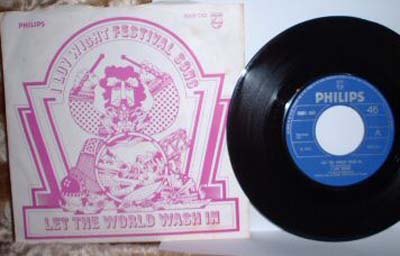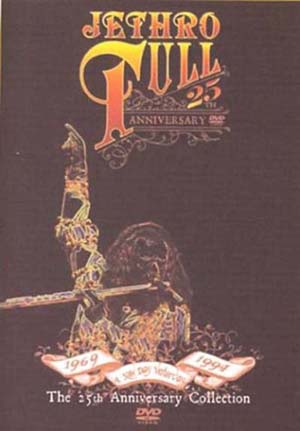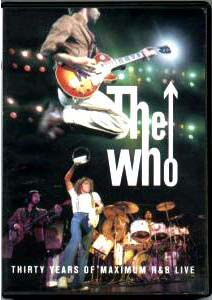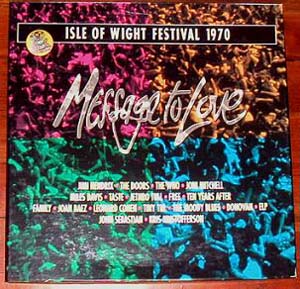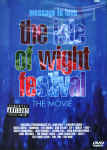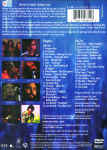|
Vinyl LP : The First Great Rock Festivals of the Seventies - Isle of Wight and Atlanta Pop Festival
Columbia G3X 30805 3-album set - Canadian issue 1971.
Also known of in US (same number) and UK (CBS 66311) pressings and seen as a CD.

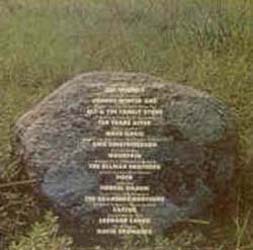
Record 1
ATLANTA POP FESTIVAL
Side 1:
JOHNNY WINTER AND - Mean Mistreater (5:48)
POCO - Kind Woman (5:14)
POCO - Grand Junction (3:26)
THE CHAMBERS BROTHERS - Love, Peace and Happiness (4:18)
THE ALLMAN BROTHERS - Statesborough Blues (4:20)
Side 2:
THE ALLMAN BROTHERS - Whippen Post (5:02)
MOUNTAIN - Stormy Monday (19:32)
Liner Notes: The Second Annual Atlanta International Pop Festival was not in Atlanta. But don't let that bring you down because what was recorded on that 104-degree July 4th weekend in 1970 was some of the best music to ever hit Byron, Georgia.
On the first day, the local newspapers read: "3-Day Pop Festival Opens; 100,000 Hip Ones Turn On." Little did the locals know that not only did it open but, before it closed, well over 300,000 of the hip, semi-hip, and big-hipped turned out for the largest rock festival to be held in the outdoor pressure cooker of Georgia. (To accurately simulate actual Festival conditions, this album should be played in a sauna bath.)
On that same first day, just a month short of the first anniversary of the birth of a nation (Woodstock), there were predictions that it would happen all over again. And for a while, it did. Rumour had it that it would be a free festival. And just 24 hours after it began, the gates were thrown open and it became the second largest free concert ever held on American soil.
The predictions continued to spook the masses: before the end of the first day, the rains came. Followed by the floods. And the muds.
Everything else at the festival was pretty much standard: bad acid, countless film crews, reeking portable toilets, overcrowded OD tents, mud-laden sleeping bags, endless apple cores, innumerable abandoned shoes and childbirth. However, the Atlanta Pop Festival does claim one unique commodity that was dispensed freely and frequently: the salt tablet. And despite the recommended dosage and continued usage, many a salt tablet-taker was mercilessly felled by the omnipresent and eager Sun.
As far as can be seen, the Age of the Rock Festival is dead. State governmental restrictions, local ordinances and a general sense of apathy have led to its demise. This album is a lasting memento of some of those troubled and happy times. To some, it represents still another live album. To some residents of Byron, it represents 27,000 tons of excess hair. But the people who produced the festival said it best: "Festival is you. That's all there is to it. It can be a quiet (or busy) weekend in the country ... just music ... a chance to be with your own people ... a heavy political trip ... a gentle thing ... violent. Festival will be exactly what you are. Where your head is will determine what the Festival will be to you." The same goes for this album.
Chuck Casell
Record 2
ISLE OF WIGHT
Side 1:
SLY & THE FAMILY STONE - Stand!
SLY & THE FAMILY STONE - You Can Make It If You Try (10:14)
CACTUS - No Need To Worry
CACTUS - Parchman Farm (9:39)
DAVID BROMBERG - Mr. Bojangles (5:48)
Side 2:
TEN YEARS AFTER - I Can't Keep From Cryin' Sometimes (19:13)
PROCOL HARUM - Salty Dog (5:11)
Record 3
ISLE OF WIGHT
Side 1:
LEONARD COHEN - Tonight Will Be Fine (6:50)
JIMI HENDRIX - Power To Love
JIMI HENDRIX - Midnight Lightning
JIMI HENDRIX - Foxy Lady (15:11)
Side 2:
KRIS KRISTOFFERSON - Blame It On The Stones
KRIS KRISTOFFERSON - The Pilgrim - Chapter 33 (6:46)
MILES DAVIS - Call It Anythin' (17:30)
Liner Notes: If it had been directed instead of indirected, the third Isle of Wight Festival last summer would have played perfectly as Theatre of the Absurd. Lasting five days - give or take a month - it rolled and rocked on a 165-acre East Afton farm on West Wight. But waiting for it to come completely together was like waiting for Godot. There was no beginning, no end, and the middle seemed to stretch on eternally. On the way, gentle absurdities and Maoist politics over 100,000 kids and dozens of groups, good rock, bad rock, highs, lows, yin, yang, and a little bit of everything rolled into one. One promoter called it "his fantasy," another wouldn't speak. A kid leaving for Detroit said he was waiting for the film to see if he understood what was going on; another from Lyonds wouldn't leave.
Where was the sense to it all? Some local farmers complained they could hear the sound five miles away, others turned up to catch Alvin Lee and Ten Years After do the meanest boogie ever imaginable. Tuned by the remembrance of Woodstock, it was toned down by confusion: contradictions were inevitable. Sly Stone turned the dial bracket emotional and electronic up to nine; Leonard Cohen and Army set it back on normal wave lengths. Jimi Hendrix was impassive, cool and elegant, his music as turgid as ever; Miles Davis was motionless: elegant, his music as unpredictable as ever before. And overshadowing it all was the realization that although this wasn't Woodstock East this was something new. Somebody sang "There'll Always Be An England" while a German communist gave the V-sign. Kids trooped in and out like a conscriptive army in retreat. Everybody wondered what was going on when it was happening right in front of them.
Okay, perhaps I'm rhapsodizing a bit here. Remember, as every soft, respecting kid between the ages of 18 months and, say, 57, knows by now, the Age of the Festival is over. (Ignore the fact that there seem to be more Festivals than ever these days, that more people are going to them, that more groups are playing. Ignore that. You know, and I know, Festivals are caput. It's just those people out there who don't seem to know. Right?) Oh, and we know that Festivals are all alike; set up like vast networks of flying circuses in a transcontinental exchange of hip and hype. We know Woodstock was counterbalanced by Altamont; that esthetics have yielded to politics; and something new just has to be around the corner.
But ...
The Isle of Wight was something else. American or Canadian festivals seemed like nice neat affairs in comparison. They were promoted neatly, and, in the main, were dispatched neatly. But the Isle of Wight seemed like a medieval joust up-dated and passed through a time loop. Polymorphic and polyglot, the mendicants arrived to dig jongleurs. It was a creation without apparent creators as, in retrospect, the Hundred Years War seemed.
In one sense, it was more natural than U.S. festivals. Natiral because it grew organically from the scene around them. It was natural theatre, seemingly indirected the way the Cavern Club once provided natural theatre. Although the British government had given the vote to 18-year-olds that year, this was still an older country. There were fewer flashy hippies there planing in from other scenes. And there were no insiders, really; for everyone had been left out of things for years. So whatever happened, you could be sure, would have to have been unlike whatever had happened anywhere else. "I was there," said a girl from Montreal. "I know I was. And I remember getting into lots of music. And I remember the names, and the songs, and the people, and the night with the fires on the hills. But, oh wow. What really happened? That's what I'm still trying to figure out. What really happened when it was so much of everything."
Later we got the news all right. There were tales of wheeling and dealing. The bad times were played up. The good times made little fill-ins slugged "extra" on the copy desk. But don't believe it. The critics at this opening had been on the beat too long. They had dragged out their critical equipment only to find it break down when it encountered living tissue. And that of course, was the music. Listen.
Peter Goddard
Return to Isle of Wight 1970 Page
Return to Home Page
|
